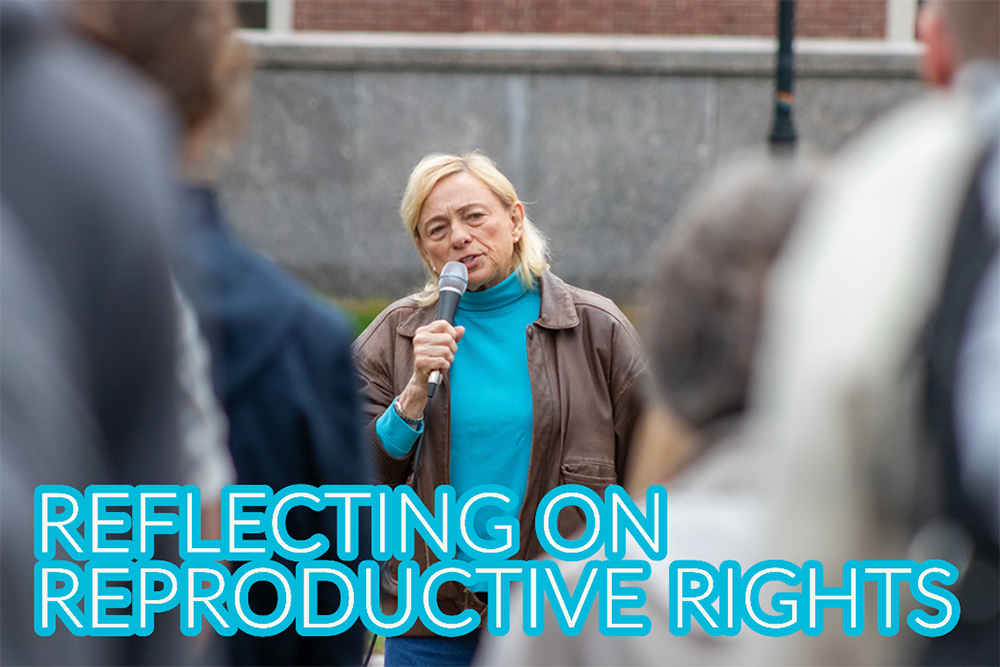On Jan. 17, Gov. Janet Mills, Senate President Troy Jackson and House Speaker Rachel Talbot Ross proposed several legislative initiatives that would expand abortion access in Maine and strengthen reproductive healthcare laws. The proposed legislation would not only increase people’s access to abortion but reduce the need to travel out-of-state to access reproductive care.
Specifically, the laws define abortion on the same level as other legal, safe medical procedures by eradicating terminology in Maine’s current laws that criminalize doctors for providing abortions. By updating data collection guidelines, the legislation also acts to protect patient privacy further, protect healthcare providers and destigmatize reproductive care.
Dana Peirce, a Yarmouth resident, inspired the bill after being forced to travel to Colorado for an abortion when her child developed skeletal dysplasia, a rare genetic mutation. At the time, Maine’s abortion laws prevented Peirce from finding a doctor that could help her get the proper reproductive health help. Mills’ proposal would extend abortion access beyond fetal viability, or roughly 23 to 24 weeks — when health professionals deem necessary.
Dr. Liliana Herakova, assistant professor in the University of Maine’s communication and journalism department and affiliate professor in the women’s, gender, & sexuality studies department, explains that reproductive care is not only limited by fetal viability standards but also insurance coverage, distance, time off and financial means.
“Added to that are the stigma and the discourses that demonize this life-saving care, furthering health inequities,” Herakova said. “The truth is that 7 in 10 Americans support legal, accessible, and safe abortions because we know that when a person wants to get an abortion but is denied, they are more likely to fall into poverty, less likely to have a full-time job, and twice as likely to be a victim of domestic violence.”
Furthermore, Herakova remarked that these issues disproportionately affect people of color, financially underprivileged people, transgender people and non-binary folks; these issues require community care.
The Mabel Wadsworth Center is an independent, feminist clinic that provides sexual education, advocacy work and individual health care to the greater Bangor area.
“Additionally, we provide testimony and opinions on legislation, which can involve conversations with legislators to provide our perspective as a sexual and reproductive health center,” Aspen Ruhlin, a community engagement coordinator at the center, said.
Mills, Jackson and Talbot proposed the laws five days before the 50th anniversary of Roe v. Wade.
Critics of the bill remark that Mills had no plans to change Maine’s abortion laws when she was campaigning last fall. House Republicans are accusing Mills of political ‘flip-flopping.’
Learning to have these difficult conversations within government spheres and personal community levels about reproductive care will make for meaningful change.
“One important piece of having productive conversations is both being willing to learn, and being willing to name the topic at hand–is someone talking about reproductive rights more generally with contraception and prenatal care, or is it a situation where abortion should be
named specifically? It’s important to keep in mind that stigma has a habit of censoring our language, even when talking about things we support,” Ruhlin said.
Attorney General Aaron Frey and Mills will discuss the possibility of protecting Mainers’ abortion rights by adding it to the Maine Constitution. Lawmakers also proposed several other reproductive health care bills, including the right for towns to override state reproductive laws.
Maine is making strides to protect reproductive rights, but Herakova points out that reproductive care extends beyond fetus development.
“I believe leadership is shown with this proposal in demonstrating that legislation has a responsibility in ensuring health equity that listens and responds to community needs. Leadership for me is a verb, however, not any one single piece of legislation,” said Herakova, “Along those lines, being a true leader for reproductive justice would mean effectively addressing issues across the lifespan, so that people and families can live in safe and supported environments, and provide and access the care they need, in both clinical and everyday contexts. Such issues include improvements in perinatal outcomes, access to affordable childcare, paid leave, and availability of affordable, healthy, and culturally-relevant foods and gathering spaces.”













